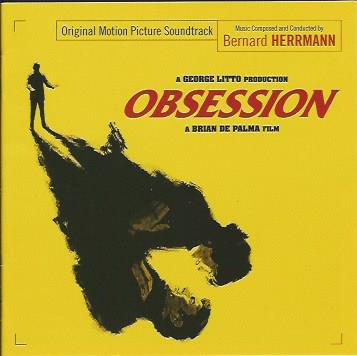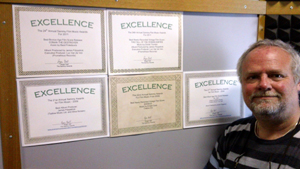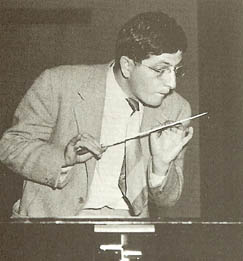
Performed by The National Philharmonic Orchestra
Conducted by Bernard Herrmann
The Thames Chamber Choir conducted by Louis Halsey
Recorded at
St. Giles Church, Cripplegate, London, England
Produced by Cyril Durant-Roger and Laurent LaFarge
Restoration and Mastering: Christophe Henault
Decca Tapes courtesy of Universal Music
Audio Research and Retrieval: Bob Simmons and Maria Blanco
CD Art Direction: David Marques
Liner Notes: Daniel Schweiger
CD 1: Comple Film Score with Three Bonus Tracks (74:00)
CD 2: The Original Soundtrack Album (39:07)
Music Box Records MBR-60
Hear excerpts from this recording conducted by the composer
-- click here
.jpg)
The City of Prague Philharmonic Orchestra and Chorus,
Conducted by Nic Raine
Choir Master: Miriam Nemcova
Concermaster: Lucie Svehlova
Recorded at Smecky Music Studios, Prague, November 2014
Organist at St. Ignacius Church, Prague, Emanuel Wittek
Produced by James Fitzpatrick
Music Reconstructed and Edited by Christopher Husted
Music Preparation by Leigh Phillips and Jiri Simunek
Sleeve Notes by Christopher Husted
Additional Notes by James Fitzpatrick
CD 1: Complete FilmScore (66:07)
CD 2: Complete Film Score (Blu-Ray Audio)
Tadlow Music 019
Hear an excerpt from this recording -- click here
Rating for Both Releases: ****
This is the first time in the 17 years of Film Music Review that two separate releases of the same film score have received a Special Merit designation. Both of them are most deserving of that designation.
Bernard Herrmann's OBSESSION (1976) was one of his last film scores released and to my mind it is his last great one. His score for TAXI DRIVER, also released in 1976, is distinctive with its smoky jazzy cues but not nearly as impressive as OBSESSION with the massive orchestral outbursts answered by soft wordless chorus. Fortunately, there have been two outstanding releases of this great Herrmann film score.
Music Box Records 2 CDs
This release has several advantages. First, it contains all the cues on separate tracks for the film score. Also, for comparison, there is the original LP album release from 1976. Both are conducted by Bernard Herrmann. Some may find his conducting lacking but I believe he was an excellent conductor and he knew what he wanted. After all, this was HIS music and HIS interpretation of that music. Since I have long admired this film score ever since it was first released and I purchased the original LP album, I don't find Herrmann's interpretation lacking and believe it is effectively used in the film as well.
In fact, I believe Herrmann's score greatly improves this somewhat bizarre and awkwardly handled film directed by Brian DePalma, which was obviously made in homage to Alfred Hitchcock's superior mystery film, VERTIGO, with another superb score by Herrmann.
Another interesting element of this score is how Herrmann puts in several familiar tunes which reflect the situations in the film. For example, in "Cemetery" (CD 1, track 20), Herrmann opens with the "Dies Irae" from the Mass of the Dead in strings.
Herrmann preferred to have a very broad contrast between the loud orchestra and the softer chorus. Strangely, the contrast sounds even better mixed on CD 2 from the original 1976 soundtrack album which remains a landmark recording from Decca.
There are vastly different dynamic levels and contrasts in various cues. Listen to the lovely softly played "Valse Lente" (CD 1, track 03/CD 2, track 01) and then to the ferocious orchestral cue in "The Ferry" (CD 1, track 07/ CD 2, track 02) which is more intense than the TA release.
Herrmann seemed to be pushing the limits or orchestral playing in this cue and it is very unnerving to listen to as it signified a key scene in the film.
The three bonus cues are nice to have though the first two are quite brief. The last bonus cue, "Airport (Alternate)" is the most impressive and worth hearing to compare with the actual cue used (CD 1, track 38) which to my ears is more effective and a better choice. But these three bonus cues are mainly for completest collectors of Herrmann's film music.
Tadlow Music 2 CDs
When listening to this release the first impression is naturally the sound is louder and more direct, especially for the orchestral sound as in the opening "Prelude" where the organ sounds more prominent. But is louder a better alternative? Though it is hard to ignore the impressive sound of this Tadlow recording, especially on the Blu-ray disc, I still find it a bit too much of a good thing. Yet the orchestra comes off quite well under Nic Raine's expert direction. The organ on this recording was from a church in Prague near the Smecky recording studio and though quite satisfactory in the performance by Emanuel Wittek, I still prefer the Herrmann version using an organ from a church often used for recordings in London. The same applies to the chorus which I prefer on the Herrmann recording where they can be heard clearer.
But in the final analysis, both these releases have their merits and are very strong with quality performances.
The Music Box release has the composer himself conducting and the music cues are separated in shorter tracks (38 in all). The Tadlow has improved sound quality because of modern technology and has the cues grouped together for a total of 20. Each has their merits for doing so and since many listeners probably don't care much about separate tracks unless focusing on one particular cue and then the Music Box release would better serve their search.
Both releases have notes that are informative and well worth reading. The Music Box notes are by Daniel Schweiger (Music Box) and well done and there are some stills from the film and one of Herrmann with director, Brian De Palma. Christopher Husted's perceptive comments on the Tadlow release are more personal about Herrmann's last years and there are also some appealing pictures of Herrmann conducting. James Fitzpatrick has added his comments about the technical aspects of the Tadlow recording for those interested in such things.
If you had to choose between these two worthwhile releases which one would you choose?
Some listeners might prefer the louder and more direct sound levels on the Tadlow release.
The sound on the Blu-ray audio disc is superb.
But if I had to choose only one release, I would pick the Music Box release because of the value of having the composer himself conducting the orchestra and with outstanding mixing of the loud and soft passages in the score, which are not quite as satisfying in the Tadlow release.
But why not get them both, and then you can have much to compare.
Like fine wine you can enjoy the full bodied flavor of Herrmann's sonic brilliance.
After listening to these two releases it is easy to become dipsy with delight over Herrmann's brilliant OBSESSION, a film music masterwork.
--Roger Hall, 3 August 2015
Read the interview with Tadlow album producer, James Fitzpatrick --
click here


DVD - OBSESSION: A Tribute to Bernard Herrmann (AMRE PTME 1041)
